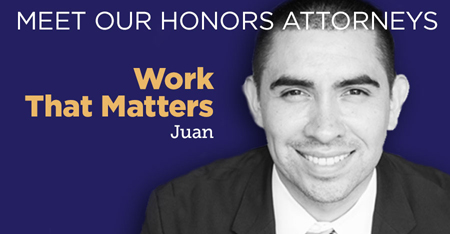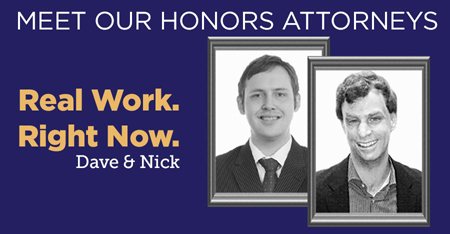Juan
 A quote from journalist-turned-novelist Tom Wolfe comes close to capturing the choice that some of our brightest young people face when beginning to prepare for a career: “put your good where it will do the most.” The problem is that it isn’t always easy to figure out how to do that – even after an attorney has committed to a career in public service. In trying to find his answer, Juan undertook a journey of sustained self-reflection that led him to become an Honors Attorney with the Solicitor’s Office at the Department of Labor.
A quote from journalist-turned-novelist Tom Wolfe comes close to capturing the choice that some of our brightest young people face when beginning to prepare for a career: “put your good where it will do the most.” The problem is that it isn’t always easy to figure out how to do that – even after an attorney has committed to a career in public service. In trying to find his answer, Juan undertook a journey of sustained self-reflection that led him to become an Honors Attorney with the Solicitor’s Office at the Department of Labor.
The journey started in El Salvador, where Juan was born and lived until immigrating to the U.S. as a child. In the years that followed, the experience began to shape Juan’s sense of civil rights and economic justice, and he began to seek out ways to help others going through the immigration experience. While working at an immigration law firm, Juan came to understand that the scope of his clients’ concerns went far beyond the immigration process, extending to a need for reassurance that our social and economic protections would apply to them – most notably in the workplace.
Juan’s blossoming sense of responsibility to those who are overlooked or underserved continues with his work as an Honors Attorney. He has been working on matters related to the Employee Retirement Security Act, which protects the retirement benefits of millions of workers. He is providing indispensable guidance on the department’s comprehensive enforcement plan to address labor law violations in Guatemala under the Central American Free Trade Agreement. And, he’s supporting the department’s enforcement of the Labor-Management Reporting and Disclosure Act, which guarantees some rights and provides some transparency for union elections.
That’s a pretty comprehensive portfolio for an attorney in his first year on the job, but for someone like Juan, whose keenest interest is to “help in any way I can,” there aren’t many opportunities that can maximize good quite like the Honors Attorney program.
David and Nick
 If there’s one thing new Honors Attorneys at the Labor Department’s Office of the Solicitor learn immediately, it’s that they won’t be waiting around to dive into the work. When landing new jobs at other organizations, attorneys can expect a long waiting period before getting their first crack at high-level assignments. Here, there’s “opportunity right off the bat.” Honors Attorneys get started working on consequential legal assignments mere weeks after coming on board.
If there’s one thing new Honors Attorneys at the Labor Department’s Office of the Solicitor learn immediately, it’s that they won’t be waiting around to dive into the work. When landing new jobs at other organizations, attorneys can expect a long waiting period before getting their first crack at high-level assignments. Here, there’s “opportunity right off the bat.” Honors Attorneys get started working on consequential legal assignments mere weeks after coming on board.
David and Nick are two of those new attorneys. It helps that they’re both accomplished professionals, well-suited to the accelerated pace of work here at the Labor Department. Still, it takes sharp reflexes and quick study to prepare for the rigors of independent assignments in a new environment, and those challenges can be invigorating.
David came to the Honors Attorney program after clerking for a judge on the U.S. Court of Federal Claims in Washington, D.C., which provided him with keen insights into the important role government attorneys play in framing and litigating important legal issues.
Nick’s journey to the program took a very different route. The Alabama native was an investigative journalist in Tennessee, covering municipal management and policy. But, he says “there’s a difference between being around things that are important and being able to act.”
When he began a summer position at the department’s Office of Federal Contract Compliance Programs, he saw for himself that if there was any place where he could have the opportunity to do something, it was here at the Labor Department.
David works in Philadelphia and Nick in Washington, and both attorneys handle heavy case loads. In the regional office, where David works, attorneys are often tasked with litigating substantial cases related to laws such as the Fair Labor Standards Act and the Mine Safety and Health Act, among others.
Nick’s work in the Washington, D.C., National Office often overlaps with David’s, as it has in Uniformed Services Employment and Reemployment Rights Act cases.
“Even as newer employees, we are provided a full and varied docket—along with big responsibilities.” David says. “That those responsibilities, from writing briefs to appearing in court, are in service to workers and their families makes the job that much more meaningful and gratifying.”
